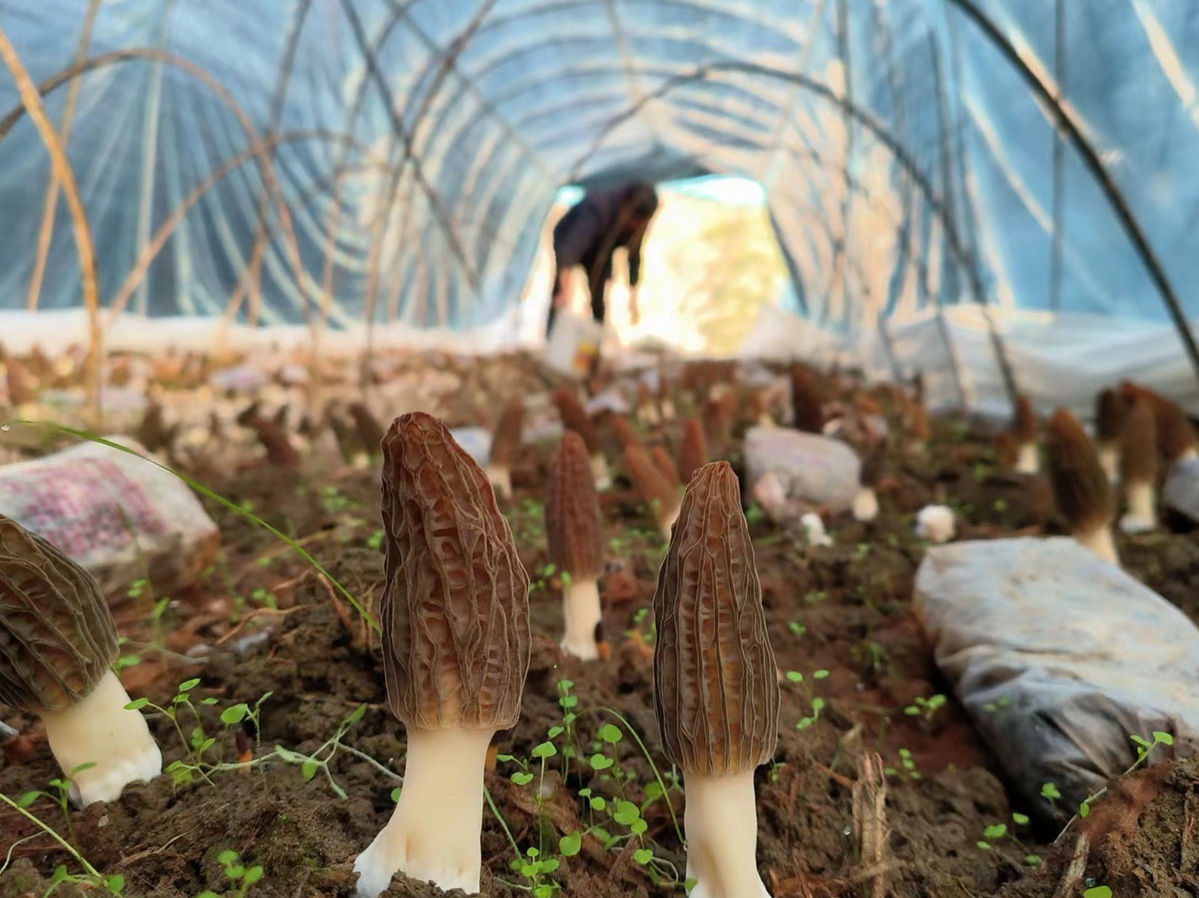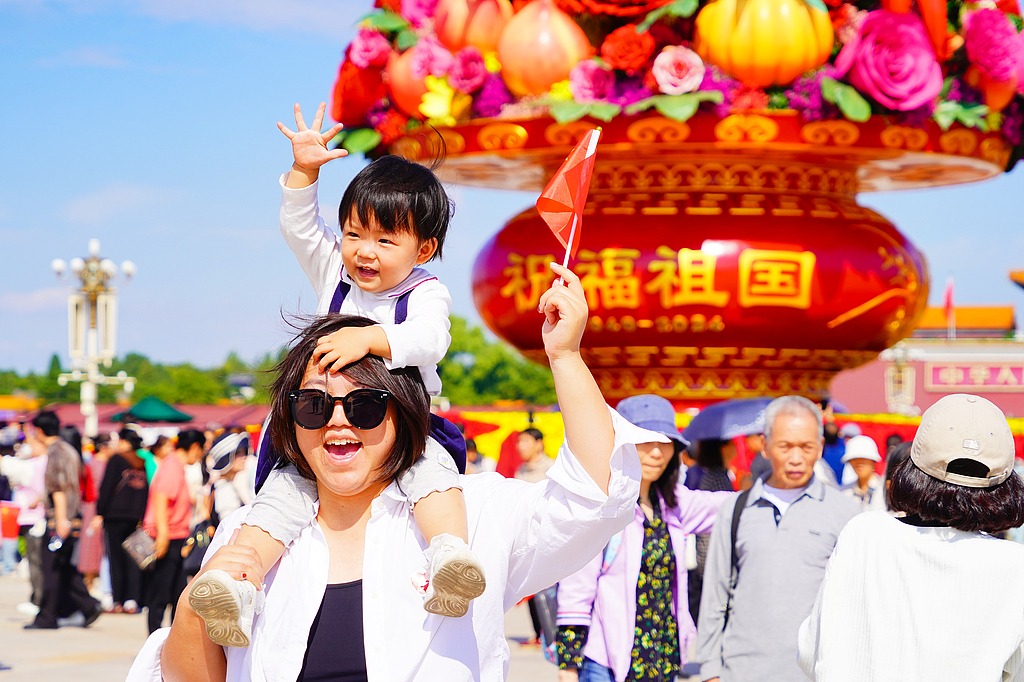Hubei's edible fungi sees mushrooming exports


As the critical period for the cultivation of edible fungi in Hubei province occurs each spring, a provincial expert team has been busy visiting the main production areas to provide guidance for the recovery of the industry after recent snow and ice disasters.
Experts offered policy consultations and technical assistance to enterprises and farmers, as well as facilitated local agricultural development.
"Hubei is a major province for the edible fungi industry in China, known for its strong production of shiitake mushrooms and as a significant contributor to exports of edible fungi," said Hu Zhengmei, deputy director of the Vegetable Office of Hubei Province.
"After years of development, Hubei has established three major advantageous cultivating regions and cultivated 25 varieties of edible fungi including shiitake mushrooms, morel mushrooms and Agaricus bisporus (button mushrooms), with products being exported to 74 countries and regions worldwide."
Suixian county, Suizhou, and Yuan'an county, Yichang, are famous for their high-quality shiitake mushrooms. Edible fungus enterprises are flourishing in these two locales, and mushroom cultivation can be seen in numerous locations.
Local brands, such as Suizhou Shiitake Mushrooms, continue to gain recognition, with products not only selling well across the country, but also being exported.
"Suizhou is one of the four major shiitake mushroom production areas in the country, the second-largest shiitake mushroom trading market and a major processing and export base for edible fungi," Ke Ke, mayor of Suizhou, said at a recent news conference.
"As a distinctive strategic sector for Suizhou and a pillar for foreign trade, the mushroom industry boasts a complete industrial system, with over 300,000 employees and a total industry output value of nearly 50 billion yuan ($6.91 billion)."
"By 2023, the number of mushroom export enterprises reached 70, including two companies with annual exports exceeding $100 million. The total mushroom export value for the city reached $1.02 billion, accounting for 30 percent of the nation's total and maintaining the top position in Hubei for 20 consecutive years," Ke said.
He also said the Suizhou Shiitake Mushroom brand value has reached 11 billion yuan, making it the only regional public brand in the national edible mushroom industry worth over 10 billion yuan.
Leveraging State-owned supply chain platform enterprises, a supply chain company has been jointly established by core mushroom industry enterprises to lead the construction of a mushroom industry supply chain system in Suizhou.
Utilizing new technologies such as big data, the internet of things and cloud computing, they have developed a smart mushroom digital application system and established a mushroom business-to-business e-commerce platform, creating an all-in-one platform for mushroom inquiries, transactions, settlements and financing to showcase Suizhou's leading role in the national edible fungi industry.
At Yichang Daziran Biotechnology Co Ltd in Yichang, batches of mushroom products are being prepared for export.
Located in Maopingchang town, Yuan'an county — known as "China's Spring Planting Mushroom Capital" — the company has developed into an agricultural industrial enterprise that integrates factory-scale cultivation, processing and sales of edible mushrooms.
"We built a canned mushroom production line in 2022 with a capacity to produce 5,000 tons of canned mushrooms annually, which can generate $50 million in foreign exchange," said Zhou Huaxiong, general manager of the company.
"Since operations began, overseas orders have surged, leading to a situation where demand exceeds supply."
In 2023, the company's exports stood at $21.5 million, with the main export products being mushroom sticks, fresh mushrooms and canned mushrooms. Mushroom sticks and fresh mushrooms are mainly exported to South Korea, while canned mushrooms are mainly exported to Russia, Southeast Asia, the Middle East, and other countries and regions.
Each spring, farmers in Maopingchang are glad to see the thriving growth of their morel mushrooms in mushroom sheds.
"There are 50 households joining in the mushroom cooperative with a total planting area of around 7 hectares," said Wang Zongbin, head of the cooperative. "Thanks to the training and promotion of the new cultivation model by agricultural experts, we enjoyed a good harvest last year and expect a better income this year."
Wang said the cooperative achieved an annual turnover of 4.8 million yuan in 2023 with a profit of around 400,000 yuan.
In 1978, Yang Xinmei, a professor from Huazhong Agricultural University in Wuhan, successfully experimented with planting shiitake mushrooms in Yangjiapeng village, Suixian county, thereby launching the development of the mushroom industry in the province.
Since then, three generations of agricultural experts from the university have engaged in more than 40 years of collaborative production, learning and research work.
Over the years, the university has continuously collaborated with leading enterprises from various regions, breeding numerous excellent edible fungi varieties.
The university has also provided training for nearly 20,000 professionals in the edible mushroom industry in Hubei as well as across the country.
A team of experts led by Professor Bian Yinbing from the university has promoted the method of "centralizing mushroom bagging and decentralizing mushroom production" in various main production areas, driving the transition to a facility-based and intelligent mushroom cultivation era.
Diseases and pests are the primary obstacles to the development of the edible fungi industry.
Bian's team has conducted research and development on green disease control techniques for major mushroom blights and improved the green disease control technology system, which uses scientific and technological methods to protect the healthy growth of mushrooms.
In recent years, the experts have teamed together with provincial-level edible mushroom industry tech-related departments, and collaborated with local governments to establish core demonstration bases for the mushroom industry, thus promoting the integration and demonstration of technologies for mushroom preservation and deep processing, as well as the widespread adoption of technologies for the recycling of organic waste from agriculture and forestry.
Hu of the vegetable office said that the development of the edible fungi industry relies on close cooperation between government, industry, academia and research institutes.
"All the units must work together to further stabilize, strengthen, green and enhance the province's edible mushroom industry chain," she said.




































